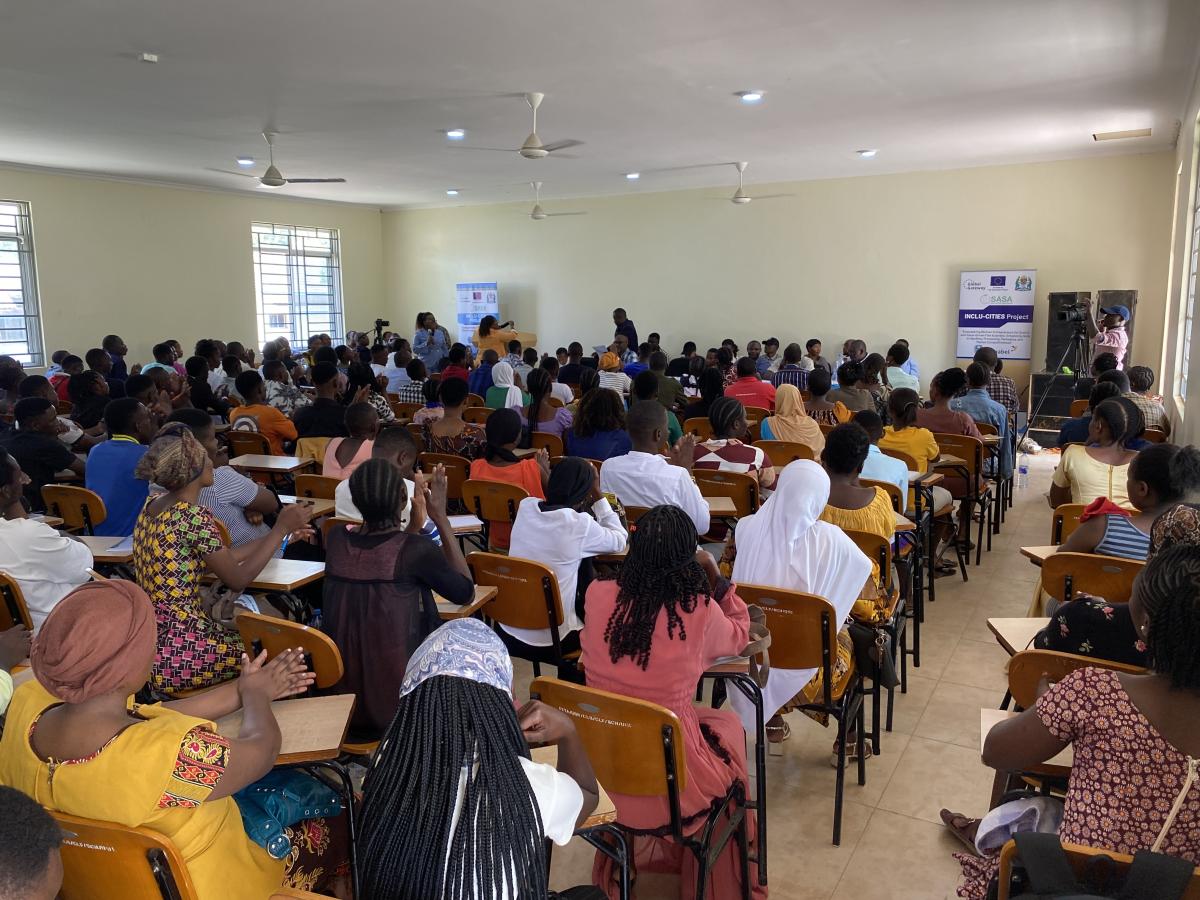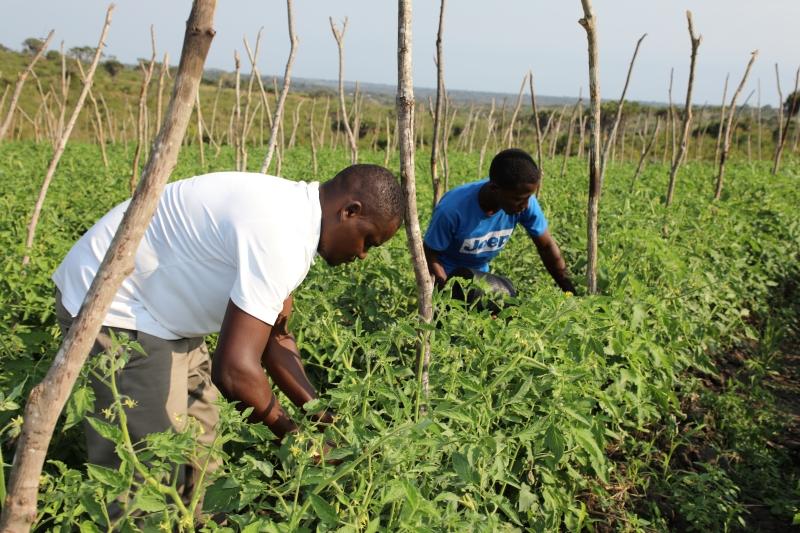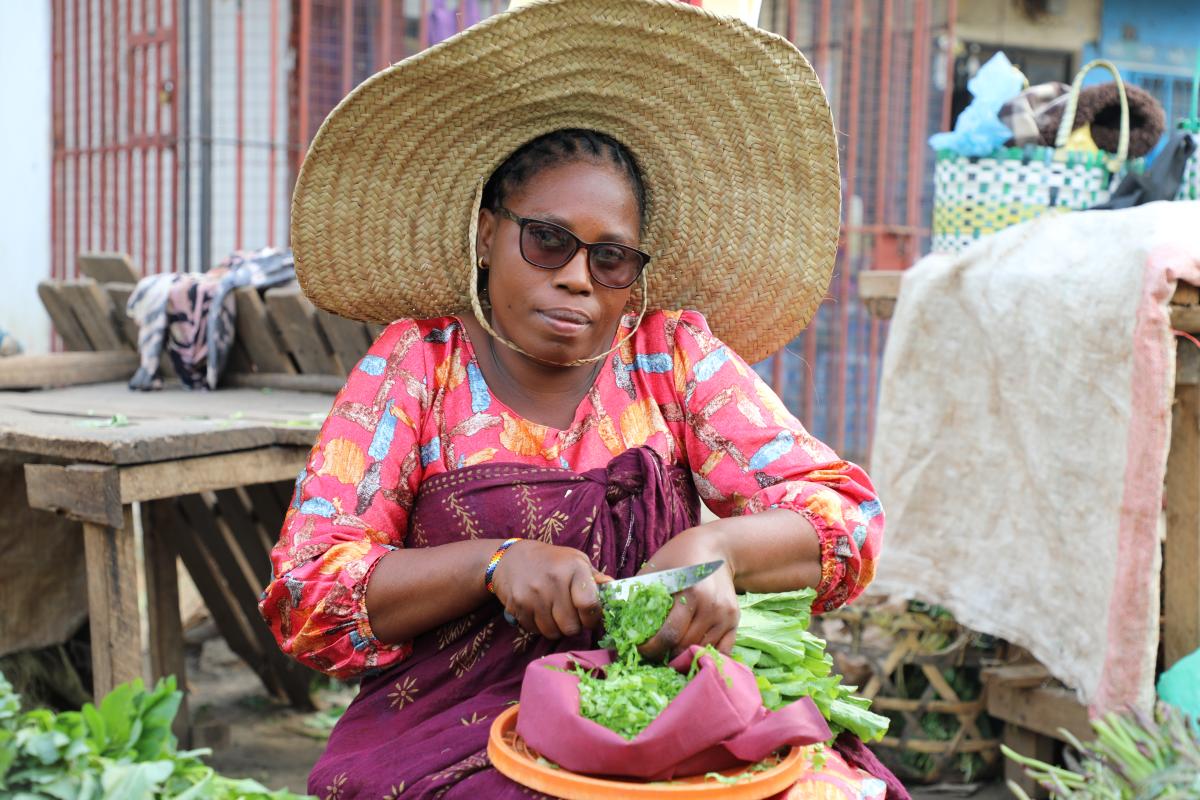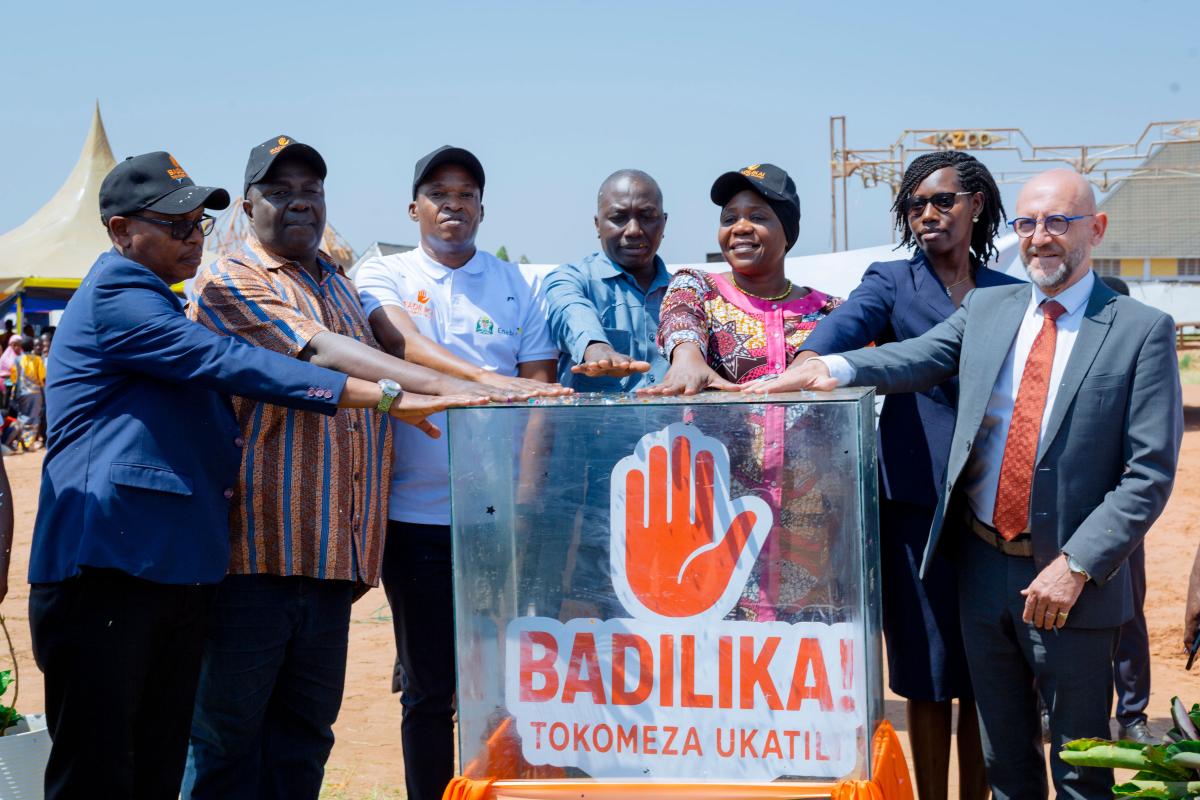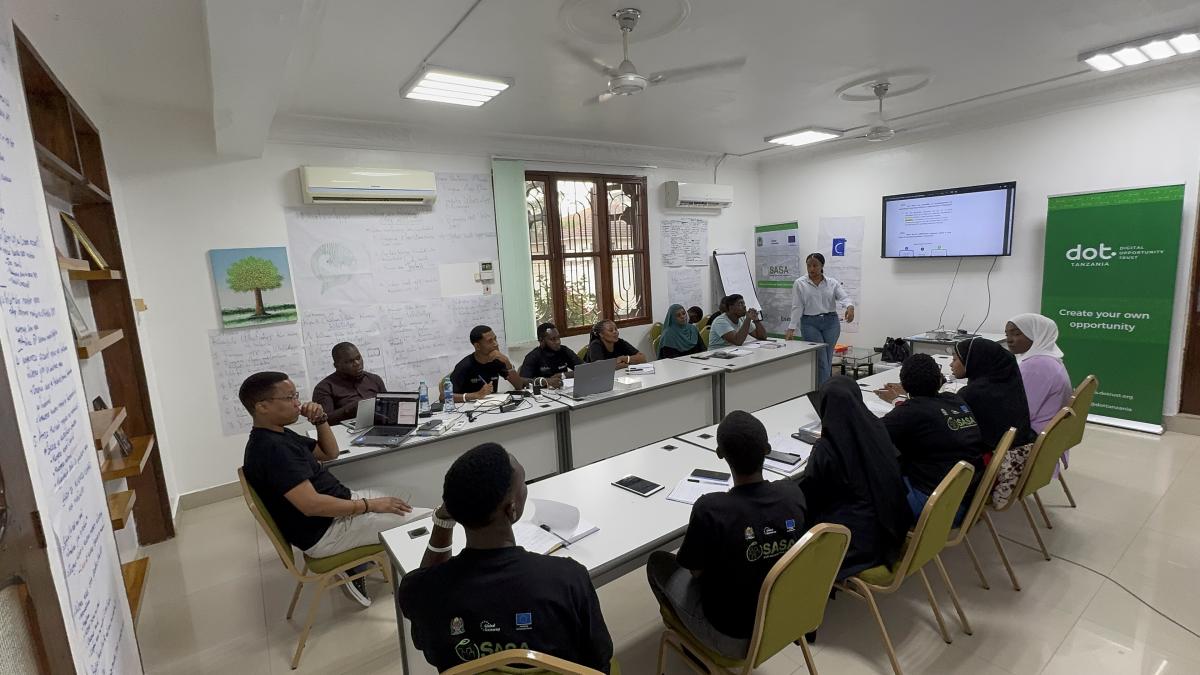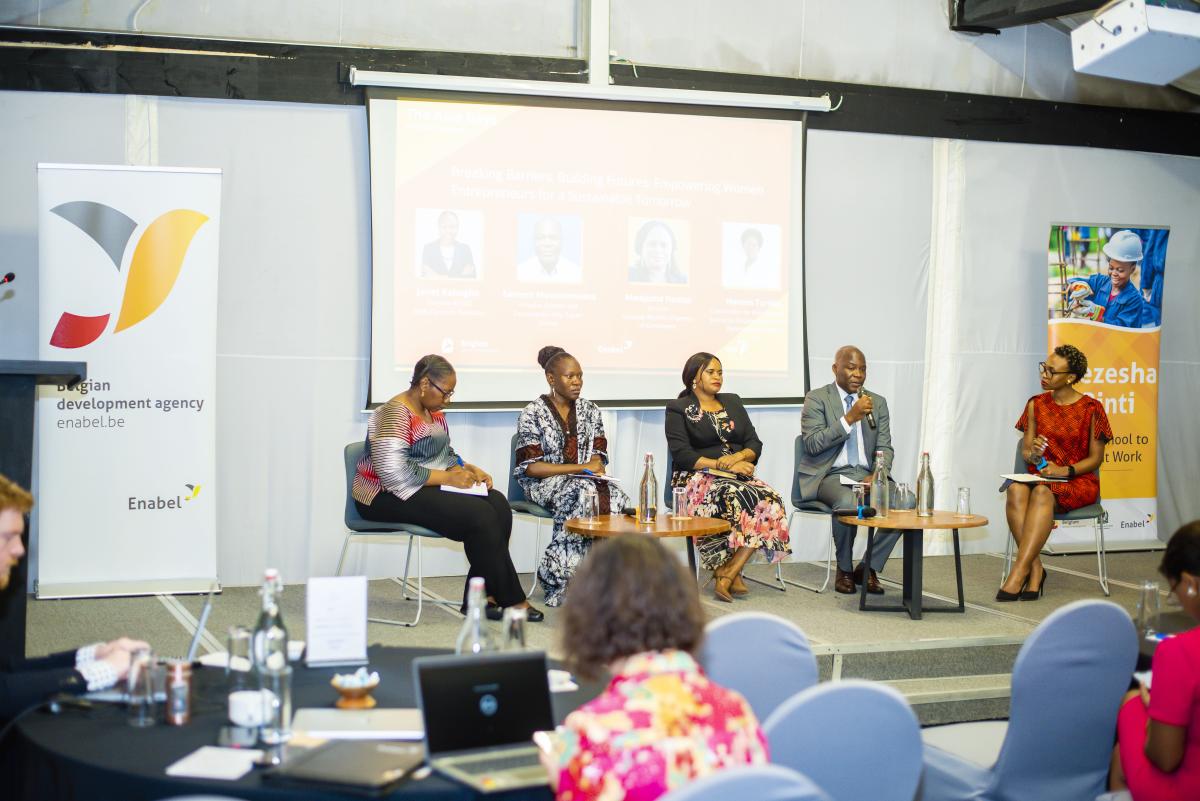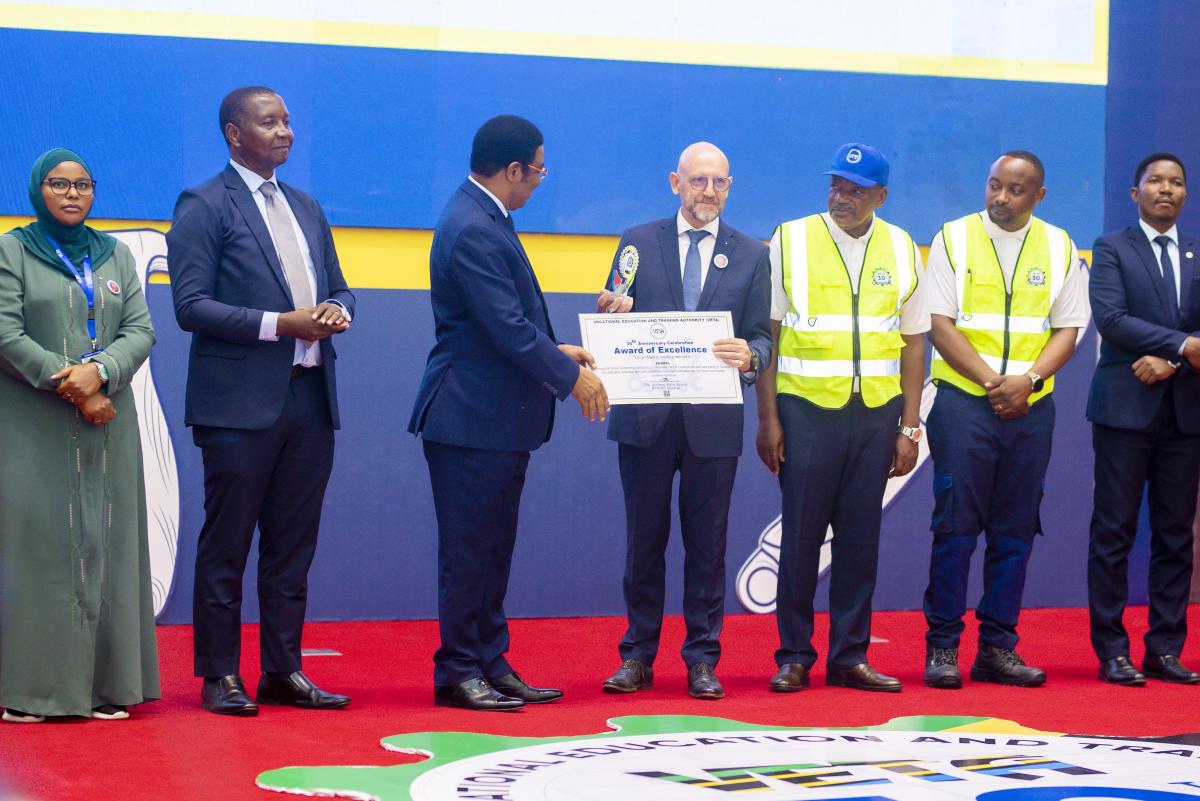Rechercher
Affichage de 1 à 15 sur 81 actualités
-
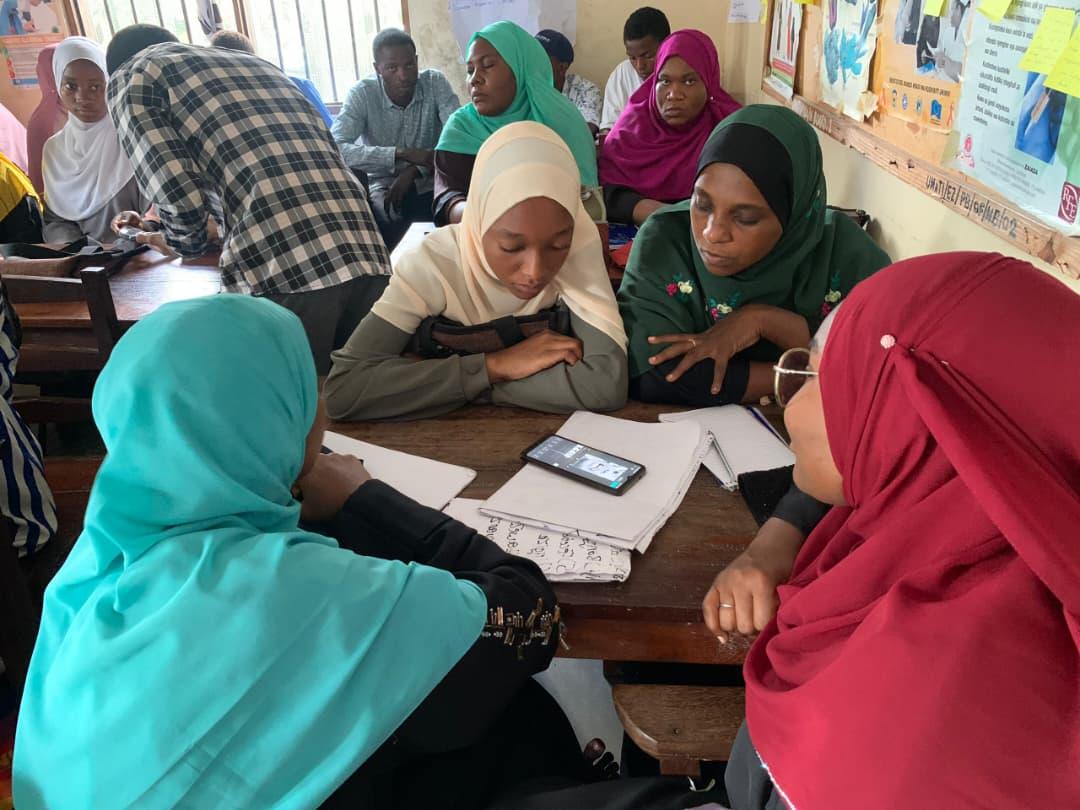
Youth Digital Ambassadors facilitate digital inclusion for Small and Medium Enterprises in Tanzania
Mkama MWIJARUBI | 22/12/2025
The entrepreneurship ecosystem in Tanzania is rapidly growing. In 2021 the Global Innovation Index 2021, ranked Tanzania as the 5th innovation ecosystem in Sub-Saharan Africa by, exemplified by a rapidly increasing number of start-ups and hubs. However, limited tools, skills and resources hold these developments from trickling down to small and medium enterprises and fuel growth. Many enterprises still only hope to make use of the digital tools. An assessment by Westerwelle Start-up Haus, a digital skills organisation in Tanzania, found that more than 80 percent face business-related skills challenges such as managing finances, sales and marketing to acquire new customers, and setting business goals. The same assessment found that businesses had technical digital skills challenges learning new digital skills, improving quality, and using digital tools. The major reasons behind the skill gap lack of programs that support entrepreneurs to digitalize and insufficient support for the local ecosystem of digital experts and creatives that empower SMEs with digitalization. The analysis of Mwanza shows there is a big gap for digital upskilling for entrepreneurs so that they may utilize digital tools and opportunities to grow their businesses. The entrepreneurs also need upskilling on business topics to better understand their financial and operational management and acquire new customers. Solution Under SASA, a program funded by the European Union in Tanzania, Enabel enlisted the partnership of Digital Opportunity Trust, Ennovate Ventures and Westerwelle Start-up Haus to fill the gap by developing program that support entrepreneurs to digitize, and upskill them in business topics that facilite their familiarity with digital tools. Ennovate Ventures worked in Mwanza, while Digital Opportunity Trust and Westerwelle Start-up Haus are working in Pemba and Mwanza. Each partner had a particular focus and method. Digital Opportunity Trust (DOT) focused on developing youth as digital ambassadors (Balozis in Kiswahili), with confidence and knowledge in digital skills, business digitization and market linkages. Overall the Digital Balozi’s will impact at least 300 young women and men, aged 18 to 35 years who own and operate micro and small businesses in their communities in transforming and scaling their enterprises through digital and green innovation in Mwanza, Pemba, and Tanga. Inclu-cities project digital program put youth at the centre of community change by equipping youth and women entrepreneurs who run micro or small businesses in Mwanza, Tanga, and Pemba with basic digital, green, and financial literacy skills. After their training, the first batch of digital ambassadors (Balozis) was contracted in September 2025 and has since been working in Mwanza, Tanga and Pemba. The Balozis linked with SASA program coordinators and other Inclu-cities project implementing partners in Tanga, Pemba and Mwanza Digital skills focused on could be data management and interpretation, digital communications including design, digital marketing, application design, basic SME cybersecurity awareness etc. Interlinked green skills could be skills related to the circular economy such as hardware reparations, recycling and solar or other types of green power. Targeting Youth (aged 18 to 35 years old) and women entrepreneurs operating micro or small businesses, the Balozi, recruited trainees through local networks of INCLU-CTIES implementing partners and local governments in Mwanza, Tanga and Pemba. “Cross partnerships with co-implementers of INCLU-CITIES is key to building an ecosystem of support and cross pollinating the impact of the program,” said Enabel Tanzania Digital Expert, Joachim Mangilima. The 10 Digital Balozi have been deployed in their respective regions where they work as pairs in program delivery. facilitation, digital business, financial literacy, 21st century and Green Skills. Deep local partnership Starting at the LGA level, digital balozis have been linked with different organisations that support their role. In Mwanza, John Christopher and Anna Paul, the pair of Digital Ambassadors secured space to run the training at the premises of the local government, at the American Corner auditorium in a famous shopping mall. Another premise was made available at a community youth centre—Fadhili Teens. Partnerships with private sector actors and local organisations — including TWCC, ZEEA, ZNCC, UMATI Pemba, Gift of Hope, PYD, Nyasaka Local Government Office, American Corner, and Fadhili Teens — played a pivotal role in mobilisation, access to facilities, and strengthening delivery. In Pemba, the Tanzania Women Chamber of Commerce (TWCC), Zanzibar Economic Empowerment Agency (ZEEA), UMATI, a youth health organisation and a community group, Gift of Hope, offered space in their premises for the youngsters to conduct classes. “We are very flexible in terms of spaces we use for our trainings,” says John Christopher, Digital Balozi in Mwanza. He and his fellow Anna Paul, have conducted classes at posh American Corner, the government office in Nyasaka community and at a space offered by a mosque. These partnerships have enabled Digital Balozis to establish strong community linkages and deliver interventions more effectively. Private sector actors and ecosystem partners such as Tanzania Women’s Chamber of Commerce (TWCC), the Zanzibar Economic Empowerment Agency (ZEEA), have been actively involved in supporting training delivery and shaping tools and methodologies that align with market needs. Trainees came because they needed the knowledge and skills. No one received any facilitation or even communing fare to participate in the trainings. As of the first week of December 2025 ten digital balozi had a total of 220 participants are actively taking part in the training sessions 173 females and 47 males. Female participants represented 78% of the total, aligning strongly with DOT’s gender inclusion model, which aims for a 70:30 female-to-male ratio. Consolata Tedeo Peter, a youth entrepreneur, selling hair extensions and spices is one of the DOT trainees in Mwanza. The training on digital business and online marketing made a difference to her hair extensions and spices business online and on location. She confesses that she have reached more clients through WhatsApp, Instagram and Tiktok and Facebook. “Initially, I posted occasionally on Whatsapp only. I used to just upload a post without detailed planning and purpose. But, now using the knowledge I learned in this training my viewers on Instagram for instance, have increased from 1000 to 6000,” she says. Instead of just posting, now Consolata plans the information that she wants to share, and she added scheduled tutorials to educate people about how they can benefit from products that she sells. “As my business is gradually growing, I’m no longer pressured to apply for jobs,” she says curtly. She completed her undergraduate training in Education three years ago. Ends
-
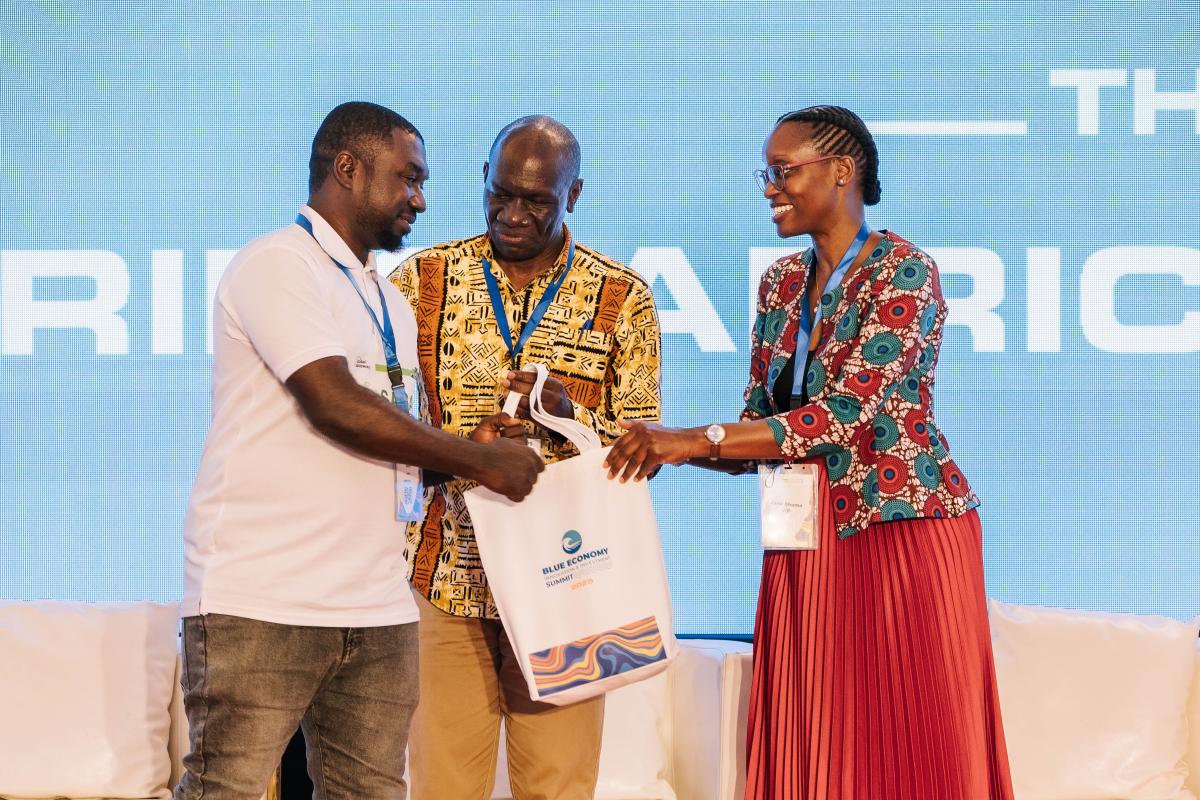
Tanzania embraces digitalisation in the blue economy
Mkama MWIJARUBI | 17/10/2025
At the recent Blue Economy Summit in Mombasa, over 700 delegates gathered to explore how innovation and investment can unlock Africa’s blue economy. Among the many insights, one theme stood out for the Tanzanian delegation, coordinated by Enabel: the power of artificial intelligence (AI) and digital tools to transform fisheries and aquaculture. Enabel in Tanzania’s team from the EU-funded Inclu-Cities Project and other partners from across Tanzania, played a central role in showcasing how digitalisation can boost local enterprises. For entrepreneurs, the summit was more than a platform for networking, it was a chance to connect with cutting-edge technologies that could redefine the future of fishing and food systems. One example came from My Fish, a company from Mwanza, which explored automated fish feeding systems developed by Japanese firm UMITRON. These AI-driven technologies monitor feeding times and optimise distribution, helping farmers reduce operational costs, minimise waste, and increase profitability. By adopting AI-powered solutions, fish farmers can improve fish health, ensure consistent growth, and reduce the environmental impact of overfeeding. This innovation aligns closely with Enabel’s digitalisation agenda in Tanzania, which positions technology as a cross-cutting driver of change across education, entrepreneurship, and sustainable resource management. Through projects that promote digital inclusion and innovation, Enabel supports local entrepreneurs in adopting solutions that enhance efficiency, competitiveness, and market access. For the IncluCities Project, the link between digitalisation and fisheries is particularly relevant. Fishing and food systems are central to urban growth and resilience, and digital tools offer new ways to strengthen supply chains, reduce losses, and connect local producers to broader markets. It also reflects Tanzania’s national development vision, where digitalisation is recognised as a catalyst for economic transformation. By embracing AI in fisheries, Tanzanian SMEs are not only modernising their businesses but also contributing to national efforts to build a resilient digital economy, create decent jobs, and promote sustainable growth. The Blue Economy Summit highlighted how technology is reshaping fisheries value chains, from aquaculture equipment and consultancy to AI-based feeding systems and circular innovations that turn fish waste into new products. For Tanzania, these insights reaffirm that digitalisation is not an abstract goal it is a practical tool that empowers entrepreneurs, strengthens industries, and advances the country’s development agenda. As Enabel continues to champion digital innovation and inclusion, experiences like these underscore the transformative potential of AI in fisheries and beyond, proving that the future of Tanzania’s blue economy is both digital and sustainable.
-
Enabel cultivates aquaculture talent in Tanzania for sustainable livelihoods
Mkama MWIJARUBI | 16/10/2025
Enabel’s Work Readiness Programme to develop entrepreneurs and skilled workers in cage fish farmingTanzania’s Fishing Education Training Agency (FETA) Nyegezi campus, a partner of Enabel in the Inclusive Green and Smart Cities (Inclu-Cities) project, has launched a four-month training programme for 150 youths in Mwanza. The initiative aims to equip participants with practical skills that will boost their readiness for employment and entrepreneurship in fisheries and aquaculture. The initiative aligns with the government of Tanzania's policy to promote youth employment and skills development. Through the European Union-funded INCLU-CITIES project, Enabel Tanzania supports this initiative with Work Readiness Programs (WRP) in a number of sectors, including fishing. The longest part of the four-month training will be spent on practical learning on fish farms. FETA collaborates with five identified fish farms in Mwanza where the WRP trainees will go for practical training on cage fish farms. This initiative contributes to Enabel’s program under Inclu-cities project that aims to create jobs and businesses in the green economy. The training was opened by Ms Merisia Sebastian Mparazo, the FETA’s Acting Chief Executive Officer, who challenged tutors and learners to take advantage of the WRP programme to develop skilled youths, therefore contributing to job creation and growth of the local and national economy. Currently, the fishing sector contributes 1.7 percent to Tanzania’s GDP and employs over six million people in the entire value chain. “By training more skilled people in the fishing value chain you are solving one of the key challenges that limit the growth of the sector’s contribution to the economy,” she said. On behalf of Enabel and the project, TVET Expert, Thomas Aikarua, reiterated Enabel’s readiness to collaborate with government agencies, private companies to promote innovative green solutions that mint jobs and contribute to local economies. Under Inclu-cities project, WRP trainees will undergo entrepreneurship skills building at SIDO Mwanza and upon successful completion of their stint they will develop projects that will compete to qualify for funding from CRDB Foundation, also a partner in the project. The fishing value chain, specifically cage fish farming, entails multiple opportunities including management of cage fish farms, fish feed manufacture, marketing, refrigeration, navigation, and fish processing and value addition.
-
Tanzania: Enabel catalyses commercializing vegetable growing in Tanga
Mkama MWIJARUBI | 24/09/2025
Tanga, a serene town of nearly 400,000 on the eastern coast of Tanzania, boasts a youthful population, re-emerging harbour and the East African Pipeline to Uganda. Arable land envelops the city, but it has not been fully put to work. Farmers grow fruits and food crops on small farms, mingled with patches of vegetable growers. In Tanzania, most small and medium scale enterprises are in agriculture, and they contribute 27percent to the DGP, according to The Tanzania Development Vision (TDV) 2025. But they contend with weak business development services, limited access to capital and high informality. “I’m a health professional that love farming, but I have struggled all along,” says Modest Massawe, vegetable grower in Pongwe ward in Tanga city. Like many farmers, he used to invest inputs in the field, without proper insight of market dynamics. Additionally, limited knowledge of proper inputs such as seed varieties, pests, and diseases led to recurring low returns. For instance, he used to water his tomatoes by carrying pails of water; upgrading to a diesel pump relieved him from carrying water with his hands, but the pump gushed the expensively pumped water excessively, depleting the water source prematurely and helping weeds to sprout. “I had to spend up to 10,000/- a day on fuel,” he recalls. This is bound to change, as farming, especially vegetable growing in urban Tanga orients itself to profit making, and become attractive to youthful farmers, thirsting to progress. Under its SASA Program, the European Union, funds the Inclu-cities project that is catalysing growth of businesses in the food systems in Tanga. Enabel Tanzania, the main implementor of the Inclu-cities collaborates with Rikolto East Africa to execute the food system initiative. In collaboration with the Tanga city, Inclu-cities spearheaded collaboration of the stakeholders in the food system to transform subsistence small holders into commercial vegetable growers, mindful of the environment and food safety. Early results foretell lasting impact. “Inclucities business-oriented approach to development initiative is proving impactful because each stakeholder involved has seen an opportunity to make profit,” says Kikolo Mwakasungula, Inclu-cities Project Manager. Farmers from Pongwe, Maweni and Amboni wards participated in a training that Inclu-cities organised to impart knowledge and skills about looking for markets, networking with input suppliers and improving productivity in growing vegetables. “We designated a number of farmers as lead farmer that will be coaching their fellows and facilitate collaboration, learning and networking with other stakeholders for the interest of farmers,” said Eliud Dotto, Rikolto’s Field Officer in Tanga. The lead farmers, including Massawe and James Kapalata in Pongwe and Maweni wards respectively, actively work with more than 300 farmers, helping them benefit from growing vegetables. In Maweni ward for example, Chote Vegetable Producers Association started after the Inclu-cities training. With more than 40 active members, the group organises learning events in their plots, where up to 70 farmers participate. Kange Mchicha, another group in Maweni was strengthened with a leadership, training and networking with input suppliers through the project. Personally, Massawe has evolved and transformed from an ambitious less informed farmer contending with losses to an informed and visionary who now understands how farming can be profitable. The solar pump and drip irrigation system that Inclucities has provided to the model farmer has flipped the outlook of many farmers. The once insufficient source of water for 2,000 or less tomato plants now suffices 4,000 plants and can cater for more. Besides, drip irrigation targets plants, depriving moisture to weeds, delaying their sprouting. “We also apply the least amounts of chemicals directly on our plants to control pests and diseases,” says James Kapalata. Instead, industrial made and plant’s scents are used to drive pests. These groups have become magnets for farm input suppliers. Kapatala and his fellow farmers grow tomato, watermelons, pepper and leafy vegetables. “What sets this initiative apart is the emphasis on safety of the produce to the consumers and caring for the environment during the production,” says the Agricultural Extension Officer in Pongwe ward, Mwanahawa Mwalimu. “When farmers see by evidence that there is proven way to rise productivity and suppress costs in vegetable growing, they happily adopt because, vegetable is a fast-moving farm produce.” Equipped with information, Kapalata and fellows negotiated with the sole buyer in Tanga for gainful prices for their pepper. “We reasoned with the buyer that offering low prices will discourage farmer from growing pepper and deprive the buyer a source of produce,” said Kapalata. Additionally, they have now secured sale contracts for their pepper from a buyer elsewhere. This EU funded initiative to catalyse food system economy in Tanga started in December 2024 and may last until 2027. Because the initiative hinges on local collaborations, its impact is likely to snowball. “We have an abundant market for vegetables in Tanga and we are only 400kms from the insatiable market in Dar es Salaam; we only need to keep the promise of profitability real among the vegetable growers,” said Mwalimu. The Tanzania Irrigation Commission has earmarked 20 acres near Massawe plot to establish a vegetable growing block. A deep well will be drilled. (need confirmation).“The ultimate goals is an ecosystem of profitable and bankable businesses where farmers, input suppliers, buyers and farmers, each can engage profitably,” said Dotto.
-
Tanzania: Traders initiated community microfinance group boosts growth of their businesses
Mkama MWIJARUBI | 16/09/2025
For a successful business of selling fresh vegetables at Mlango wa chuma market in Tanga you need capital, space in the market, good quality produce from farmers and, customers. One of these ingredients is scarce for most traders in the market. Capital, perplexingly. Vegetable sellers in Mlango wa Chuma and Mgandini Markets struggle with capital not only because their merchandise is perishable but also, they lacked essential financial skills. Big pictureIt is estimated that Tanzania's SME sector consists of over 3 million enterprises that contribute 27% of the overall GDP. More than half are owned by women. They are pestered with weak business development services, high informality, weak governance and capital. Community taste—and demand— for fresh farm produce hook vegetable traders at Mlango wa Chuma to a one-day business cycle—buy fresh produce at sunrise dusk, sort, sell, buy your domestic needs, tomorrow—repeat. Whenever an emergency gutted cash flow, most traders floundered without cash to buy fresh produce the next morning. “I had no choice except borrowing from loan sharks. High interests dragged on. I was on a cliff every day,” says Lailat Awadh, a vegetables' trader at Mlango wa Chuma. The Building Bridges program in Tanzania found that 15 out of 20 SMEs rely on personal or family sources for loans. With hundreds of small and medium businesses in urban areas in Tanzania straddling partial growth and collapse cities could not be inclusive, safe, resilient and sustainable. With funding from the European Union in the Inclu-cities project, Rikolto East Africa set up and facilitated partnership with Tanga City Council to unite stakeholders that offer financial and non-financial services to (food) entrepreneurs in and around the city. Rikolto identified and invited small scale traders and imparted knowledge about financial management skills and business growth pathways. From Mlango wa Chuma 17 traders participated; Mgandini sent 23 traders. Formation of saving groups Rikolto, did not form groups for them or placed a condition for them to group up to get some support. “After the training,I asked folks that participated, why don’t we start a saving group to help ourselves with building discipline for saving?” says Awadh. Five agreed right away to set up Mlango wa chuma Community Microfinance Group, obliging each member to deposit saving every day and committing to direct savings to grow their businesses. In eight months, their saving has grown to more than 8m/- by August 2025. These results resonate with Inclu-cities objective to work with Rikolto in supporting formation of medium and small-scale enterprises as well as needs-based training to business owners. “The fact that these traders direct their savings to grow their businesses is evidence that they are applying the knowledge they received in the trainings they participated,” says Kikolo Mwakasungula, Inclu-cities Project Manager. Growth of businesses Every member of the group has a rosy story about the positive changes in their businesses. None borrows from loan sharks anymore. None buys produce on credit. Each has financial means to diversify in terms of produce they buy and sell. “Because I pay cash, I have power to choose only the best produce,” They also initiated another saving fund for buying key domestic needs for their homes at wholesale prices. “It saves me a lot of money on home supplies and helps me save more to focus on the business,” says Bakari Harid Mpanga, a trader and now vice chairperson of the savings group. Spread of a good practice Traders that initially were hesitant to join the saving group have also organised into a savings group—with 35 members. According to Eliud Dotto, Rikolto Field Officer in Tanga, similar savings community has been initiated at Mgandini Market - the second-biggest market in Tanga. “Empowering traders in the markets to grow their business will positively impact the food system in Tanga,” he says. According to Awadh and her fellows, now they are firming their plans to start a poultry rearing business using their savings of the group and, if possible, a loan to augment the capital. Now, that obtaining and growing a capital has been solved, the success of traders at Mlango wa chuma market is not only a possibility, but realisable. The market’s name, - translated iron door - derived from its original iron clad entrance, will distinguish it again as place of successful city traders in the heart of Tanga city’s storied geometrical perfect layout of the streets.
-
What does change mean for the Kigoma region?
Proscovia GREGORY | 31/07/2025
If we want to end gender-based violence, we can’t rely on promises, we have to shift mindsets, challenge silence, and rebuild the systems that have allowed harm to go unchecked for too long. That shift officially began this week in Kigoma with the launch of Badilika: Tokomeza Ukatili, a campaign aimed at preventing and ending violence against women and girls. Spearheaded by Enabel in Tanzania, together with local women- and youth-led organisations in Kigoma and the Government of Tanzania through the Ministry of Community Development, Gender, Women and Special Groups, the campaign is rooted in one powerful belief: that change is possible when communities lead it themselves. The launch, held at Mwanga grounds, was a moment of energy, reflection, and commitment. Hon. Dr. Dorothy Gwajima, Minister for Community Development, Gender, Women and Special Groups, officially opened the campaign with a call to action: “Badilika! Ukatili Kigoma sasa basi!” She reminded the crowd that violence is not inevitable and that through community-led action, Tanzania can create a future free from fear, silence, and harmful social norms. Enabel’s Country Director, Mr. Koenraad Goekint, underscored the importance of local ownership and youth leadership, noting that “real change begins in our homes, our schools, our places of worship, and our communities. It requires each of us to take responsibility to listen, to speak out, and to act.” A powerful musical performance by Dogo Paten energized the audience, amplifying the campaign’s message through rhythm, lyrics, and local voice. But this campaign is more than a one-day event. It is a movement aiming to reach 150,000 community changemakers by 2027,individuals who will each inspire at least three others to shift attitudes and behaviours, challenge harmful traditions, and take a stand against gender-based violence. The approach is intentional, personal, and bold. The next day, the Minister visited sites where this kind of change is already underway. The morning began at VETA Kigoma, one of the Wezesha Binti project grantees under Result Area 2. In the masonry class, students demonstrated practical construction techniques, including work inspired by stone-arch bridge building from the SAKIRP project. The Minister later visited one of these completed bridges in Bweru village, seeing first-hand how local skills and knowledge are being passed on, turning infrastructure into both employment and empowerment. While at VETA, the Minister was also introduced to the Gender Desk supported by Enabel. Though small in scale, the desk plays a vital role in helping students report gender-based violence, access guidance, and get referred to trusted service providers, from paralegals and police gender desks to one-stop centres like the one at Maweni Hospital. These are the safe spaces where stigma breaks and support begins. In the afternoon, the visit continued to Wakulima Secondary School, one of 25 secondary schools supported by the Wezesha Binti project. There, the Minister saw how education is being used not only to teach, but to transform. The school is part of a wider strategy to address the barriers girls face in accessing and staying in school, from harmful gender norms to distance, stigma, and poverty. Through close work with parents and local leaders, the project uses the Champions of Education model to strengthen community advocacy and mentorship. Menstrual Hygiene Management mobile tents have already reached hundreds of students with vital information on sexual and reproductive health and rights, and new gender-sensitive SWASH facilities are being installed to create safer, more inclusive school environments. The school is also addressing affordability directly. At Wakulima alone, 16 students including 12 girls are receiving full support, covering uniforms, learning materials, food, exam fees, and boarding needs. And with 17,550 textbooks distributed across all 25 schools, including 200 for Wakulima, students now have better tools to succeed. All 19 teachers at Wakulima are enrolled in continuous professional development programmes that cover gender-responsive teaching, ICT, STEM, climate education, and learner-centred approaches. At the heart of all of this is one core message: “when girls are safe, supported, and seen they thrive. And when a community invests in its girls, everyone rises”. At the end of the day, the Minister awarded certificates to 154 youth, 43 of whom had completed modular training in stone-arch construction, while others were recognized through prior learning in food processing and tailoring. For many, this recognition was more than formal. It was a reminder that their future is theirs to shape. In Kigoma, the campaign isn’t asking for change. It’s proving that change is already happening. Through local leadership, through youth-led action, and through the kind of collective commitment that turns vision into reality. Badilika! Ukatili Kigoma sasa basi. Because when transformation begins with people, it doesn’t just last it multiplies.
-
Tanzania: First cohort of youth digital ambassadors equipped for deployment
Mkama MWIJARUBI | 11/07/2025
DOT Tanzania, Enabel implementing partner in the Inclu-cities project, has kicked off its first training of community youth digital ambassadors, branded Digital Balozis. The cohort consisted of 10 youths. They have been equipped with the digital, soft, financial, and green skills needed to navigate and address their daily challenges, including adapting to and mitigating climate change, embarking on new career paths, starting small businesses, participating in civil society, or designing solutions to community challenges. After their training, Digital Balozi will go for community deployment from July to December 2025. In their deployment, they will provide SMEs with essential business and digital skills, business digitization and market linkages. Their work will foster scalable and commercially viable businesses that drive job creation, address local challenges, and strengthen regional economies. Inclu-cities’ Digital Balozi programme is designed to put youth at the centre of community change by equipping youth and women entrepreneurs who run micro or small businesses in Mwanza, Tanga, and Pemba with basic digital, green, and financial literacy skills. In the Digital Balozis programme, the Inclu-cities project leverages, DOT’s youth-led model, rooted in a proven assumption that by transforming the individual, the individual can transform their society. Overall the Digital Balozi’s will impact at least 300 young women and men, aged 18 to 35 years who own and operate micro and small businesses in their communities in transforming and scaling their enterprises through digital and green innovation in Mwanza, Pemba, and Tanga. Global research has shown that youth peer-to-peer training approaches are more effective because they reduce age-related hierarchy in the learning environment, as they allow young people to learn from those who are socially more similar to them Through this peer-to-peer model, youth become catalysts of change in their community - creating a ripple effect, whereby through sharing knowledge and skills with, and building confidence among their peers, families, and communities at large, one youth’s actions creates and gains momentum leading to widespread behaviour change.
-
Catalyzing Change: Awa Prize Days Champion Women Entrepreneurs and Green Growth in Tanzania
Proscovia GREGORY | 10/06/2025
In May 2025, Tanzania became a focal point for celebrating and advancing women's entrepreneurship, particularly within the context of inclusive green growth. Enabel, the Belgian agency for development cooperation, spearheaded the Awa Prize Days across Kigoma and Dar es Salaam on the 14th and 16th. More than just events, these gatherings served as dynamic platforms connecting women entrepreneurs with government representatives, private sector leaders, international organizations, and development partners. The two-day program featured practical training, cross-sector dialogue, and peer learning—critical elements in strengthening a more inclusive and resilient ecosystem for women-led businesses, particularly those driving circular and green economic models.The significance of this initiative was highlighted by the presence of Fanny Heylen, Head of Cooperation at the Embassy of Belgium in Tanzania. Representing Belgian cooperation, she reaffirmed Belgium's dedication to gender equality and women's economic empowerment as crucial drivers of sustainable development. "Empowering women entrepreneurs is not only a matter of equity, but a smart investment in a more sustainable and resilient future," Ms. Heylen remarked, setting a collaborative and forward-looking tone for the discussions. The event strategically bridged grassroots capacity building with high-level policy dialogue. In Kigoma, the focus was intensely practical. Forty women entrepreneurs, part of the Awa Prize network and the Wezesha Binti project (Belgium’s initiative for adolescent girls and young women), took part in an intensive workshop aimed at strengthening their capacity with modern business strategies, tools, and skills essential for sustainable growth. Facilitated with support from the ILO, PASS Trust, and Her Initiative Tanzania, sessions covered digital tool adoption, business formalisation, labour law navigation, finance access, and local market engagement. Beyond the training, an exhibition allowed participants to showcase their products and, importantly, share their personal journeys, highlighting the resilience and innovation required to overcome barriers in the entrepreneurial landscape. “As a woman entrepreneur, balancing family care and business can be challenging", explained Zainab Seif Kabobo after the workshop. "Today, I have learned many new things, but I also realized that many actions I am already taking are leading me on the right path as an entrepreneur. Next time I attend this type of workshop, I would like to be the person who shares her good practices.” The conversation evolved in Dar es Salaam, shifting towards systemic change during a high-level networking event at the Coral Beach Hotel. A key panel, "Breaking Barriers, Building Futures," tackled the deep-rooted challenges women face in business. Leaders like Ms. Mwajuma Hamza (TWCC), Ms. Noreen Toroka (ILO), and Enabel's own Mr. Earnest Musinamwana, alongside AWA Prize winner Ms. Janet Kabugho (Uganda), debated crucial needs: better access to finance, gender-sensitive policies, and stronger cross-sector collaborations to help women scale their ventures. A second panel zeroed in on the future: "Women Entrepreneurs Leading the Way to Inclusive, Green, and Smart Cities." This session explored the vital role women play in driving innovation and sustainability, particularly within the circular economy. Experts like Ms. Sara Prima, Ms Nusura Myonga from Her Initiative, Mr Pius Matunge from Tengeneza Generation alongside AWA Prize winner Ms. Kathia Iradukunda (Burundi). The discussion showcased inspiring examples, from green startups to digital empowerment projects, reinforcing the necessity of nurturing inclusive innovation ecosystems where women and youth can lead community transformation. The Awa Prize Days initiative in Tanzania is a clear manifestation of Enabel's wider commitment to dismantling the structural and cultural obstacles hindering women's economic participation. By connecting local innovators and entrepreneurs through platforms like the Awa Prize and Wezesha Binti, Enabel actively links grassroots solutions to broader sustainable development goals. As Jovitha Mlay, Enabel Tanzania's Gender and Social Inclusion Expert, highlighted, Tanzanian women are already leading innovation; the critical need is for "sustained support, visibility, and access to opportunities." The Awa Prize Days represent a tangible step towards fulfilling that need, fostering a future where women entrepreneurs are central to Tanzania's inclusive and sustainable growth. “At the Awa Days, I learned many things. The most important element would be the power of networking. I will use this network to promote and sell my products in the future.” explained Sister Evangelista Chubwa.
-
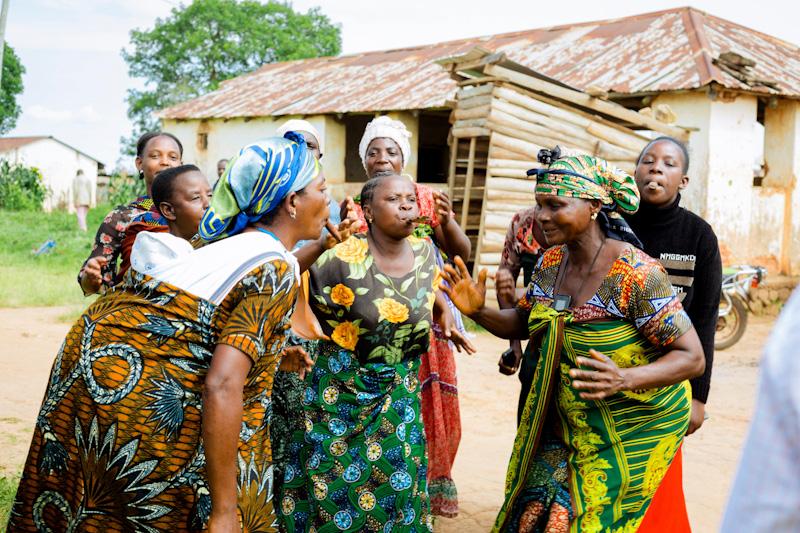
Tanzania : Strengthening women’s movement in Kigoma Amid Fragmentation and Scarcity
Jovitha MLAY | 22/05/2025
In Tanzania, women’s organizations serve as critical platforms for addressing gender inequality, promoting economic empowerment, and advocating for social justice. However, in Kigoma Region, women movement often face serious structural challenges that hinder their collective impact. A lack of coordination among groups, coupled with limited resources and organizational capacity, has created fragmented efforts that struggle to gain traction. As a result, the women’s movement in the region, remains underdeveloped, despite the growing need for unified action. In this context, Wezesha Binti- a bilateral program in Tanzania is working in strengthening the women movement in Kigoma, by connecting fragmented efforts, building capacity and empower them to grow into a cohesive and influential force for gender equality. In the absence of strong networks linking women’s organizations, Wezesha Binti organized workshops for women’s, youths and People With Dissability organizations in Kigoma to coordinate their efforts, define the agenda and decide on the approaches that would challenge traditional power structures and reshaping local governance, specifically on Gender equality. With majority of these organizations work around social justice, environmental management, climate change and gender equality, the women movement are now organized to collectively work towards addressing violence against women and girls and challenge social norms that perpetuate inequality. With limited resources, these community level efforts lay the groundwork for more organized and powerful movements engaging the local government authorities, individuals, families, groups, traditional leaders, local markets, churches, and schools as the backbone of the movement. Through storytelling, community meetings, and small cooperatives, the movement will share strategies, mobilize support, and create spaces for collective action, strengthen their legitimacy and presence.
-
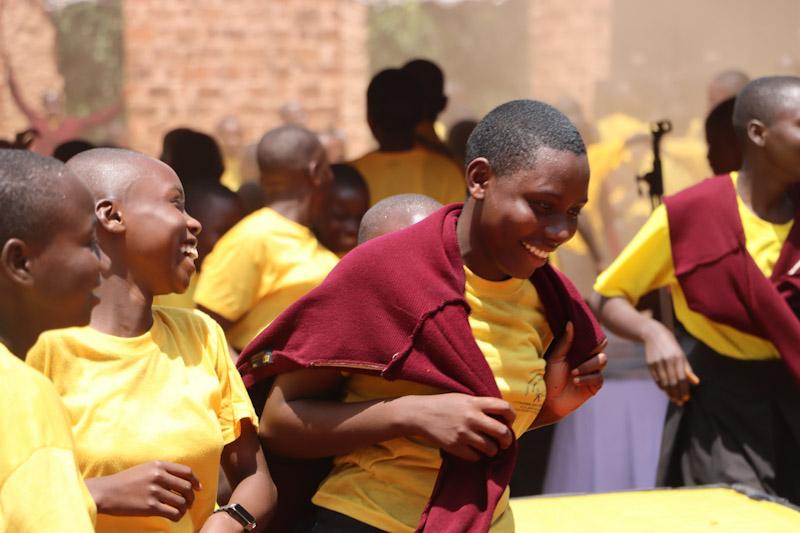
Tanzania : Mobilizing communities to end violence against women and girl
Jovitha MLAY | 20/05/2025
A gender transformative step in the fight against gender-based violence has begun in Tanzania’s Kigoma region, as Wezesha Binti, in collaboration with Plan International, officially kicks off the implementation of the SASA! Approach to address violence against women and girls (VAWG). SASA!, is an acronym that stands for Start, Awareness, Support, and Action, focusing on shifting social norms and power dynamics that perpetuate VAWG. Following a successful proposal selection, the SASA! Initiative—a proven community mobilization methodology—is now being rolled out by a consortium of three organizations: Plan International, Kivulini Women’s Rights Organization, and the Women Promotion Center. These organizations have a long term programme and roots in the Kigoma region, working on gender justice. The programme aims to mobilize communities in Kigoma to recognize and address the underlying drivers of gender inequality. Through grassroots engagement and cross-sector collaboration, the SASA! Model encourages individuals, families, and institutions to examine beliefs around power and equality. With the Kick-Off meeting to start the implementation taking place in Kigoma, Enabel and partners are working to align workplans and discuss how the partners’ actions contribute to the broader goals and measurable outcomes of the Wezesha Binti (WB) program. The aim is to accelerate implementation and increase efficiency. By bringing together civil society, academic institutions, and international development actors, this project sets the foundation for a sustained, evidence-based response to violence against women and girls in Kigoma. “This collaboration is not just about delivering a project—it’s about building a movement,” said a representative from Wezesha Binti. “Through SASA!, we’re empowering communities to take ownership of the change we all need to see.” As the programme unfolds, its success will serve as a model for broader replication across Tanzania and beyond—helping create a world where women and girls can live free from violence and discrimination.
-
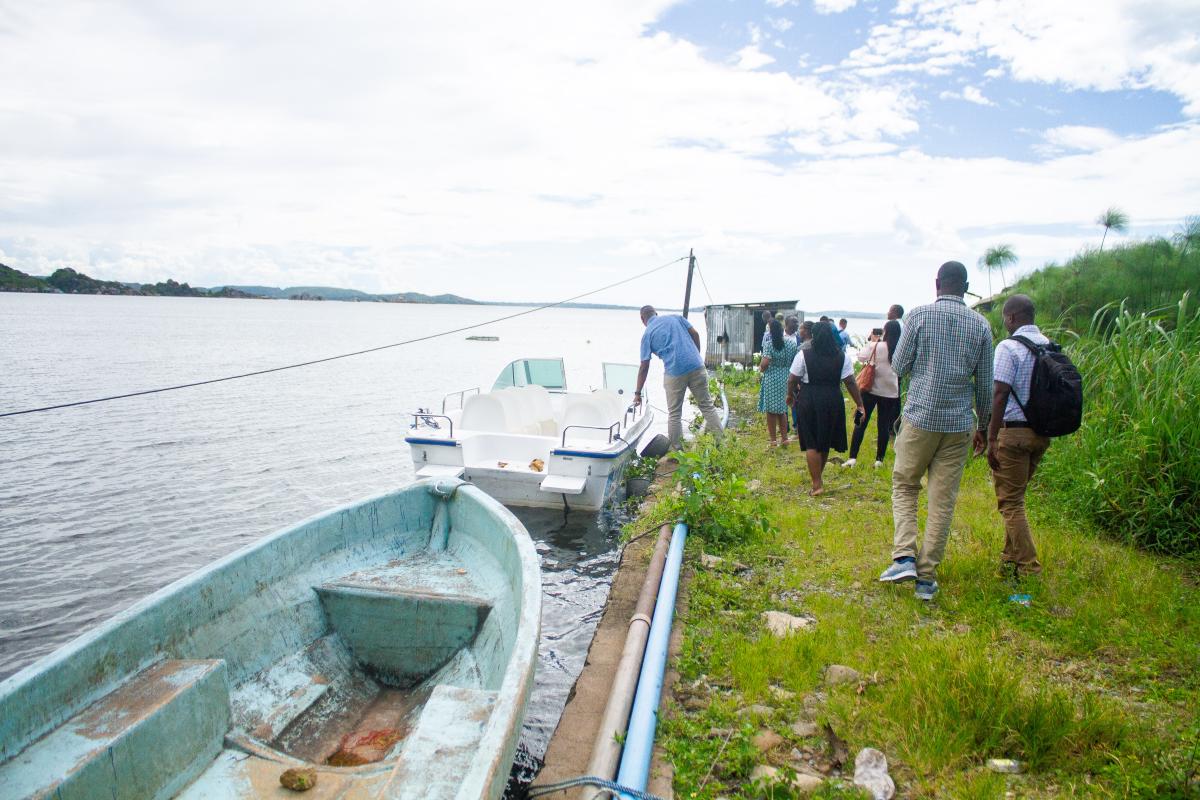
Tanzania : Fisheries College Mwanza embarks on becoming Centre of Excellence
Mkama MWIJARUBI | 19/05/2025
The Fisheries Education and Training Agency (FETA) Mwanza campus convened representatives from industry, regulators and businesses in the fishing value chain to explore potentials areas of collaboration that will ensure the institution remains relevant, responsive and sustainable. The meeting on 19 May bought together companies and government institutions with interests in the fishing sector in Nyamagana and Ilemela districts learned about possible areas of partnership with FETA Mwanza in the bid to implement the institutions roadmap to becoming the centre of Vocational Excellence in fisheries and aquaculture training. They discussed areas for improvement for FETA Nyegezi to achieve the status of a Smart Centre, contribution that can be made by each stakeholder, labour market needs in the fisheries and fish farming and, methods to ensure that training provided is inclusive and sustainable. With implementation support from Enabel Tanzania through the European Union funded IncluCities Project; FETA is now implementing a road map that will see the institution strengthen its support of the fishing, a sector that hinges the economy of Mwanza and neighboring regions. Currently, FETA Mwanza produces 100 graduates annually in four courses namely: certificate/Ordinary Diploma in Fisheries Management and Technology, Certificate/Ordinary Diploma in Fisheries Science and Technology, Certificate/Ordinary Diploma in Aquaculture Technology and Refrigeration and Air Conditioning Mechanics. This set to change, as the college listed 12 new courses. More importantly, FETA road map to CoVE, involves strong partnership with private sector, aligning training with industry needs, strengthening practical and technical skills, promoting innovation and sustainability in the blue economy and enhancing regional and international recognition. FETA’s National Chief Executive Officer, Dr. Semvua Mzighani, officiated the meeting, encouraging the private sector participants to seize the partnership opportunities. “You have a unique role to play in this transformation journey. Your participation is crucial, especially in the evaluating our curriculum, providing field attachment opportunities, participating as temporary trainers from industry, providing expert advice, improving or donating training facilities and infrastructure,” said Dr. Mzighani. FETA Mwanza convened the meeting following participation of its leadership in SASA sponsored TVET COVE roadmap training organised by Enabel two weeks ago for leaderships of all TVET colleges that collaborate with Enabel to implement the skill development program in Inclu-cities Project. Fish farmers, trainers, regulators, fishing lab officers, cage markers, factories, fish processors, pooled ideas and observations; then had a tour of FETA to look at physical infrastructures where they can invest in partnership with FETA Mwanza. With funding from the European Union, Enabel Tanzania implement INCLUCITIES project that involves skill and business development in fishing sector.
-
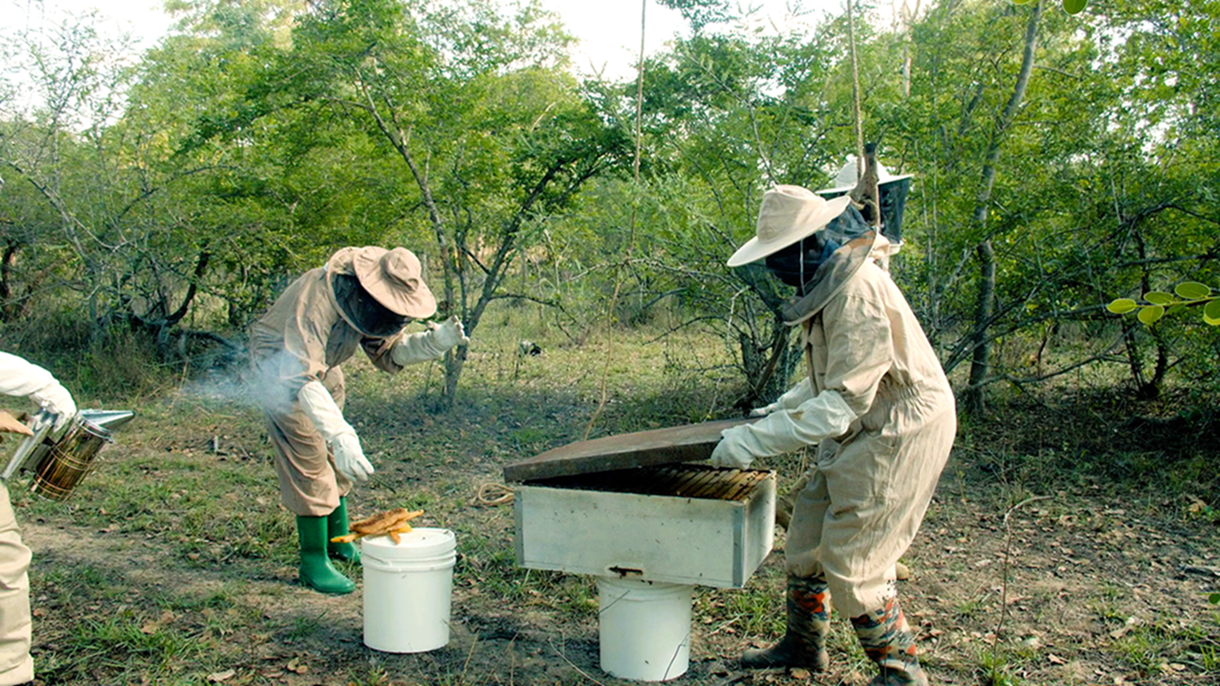
Understand the Beekeeping Value Chain in Tanzania
Deogratius KIMENA | 07/05/2025
View the video here https://youtu.be/jnTpJJelj_0
-
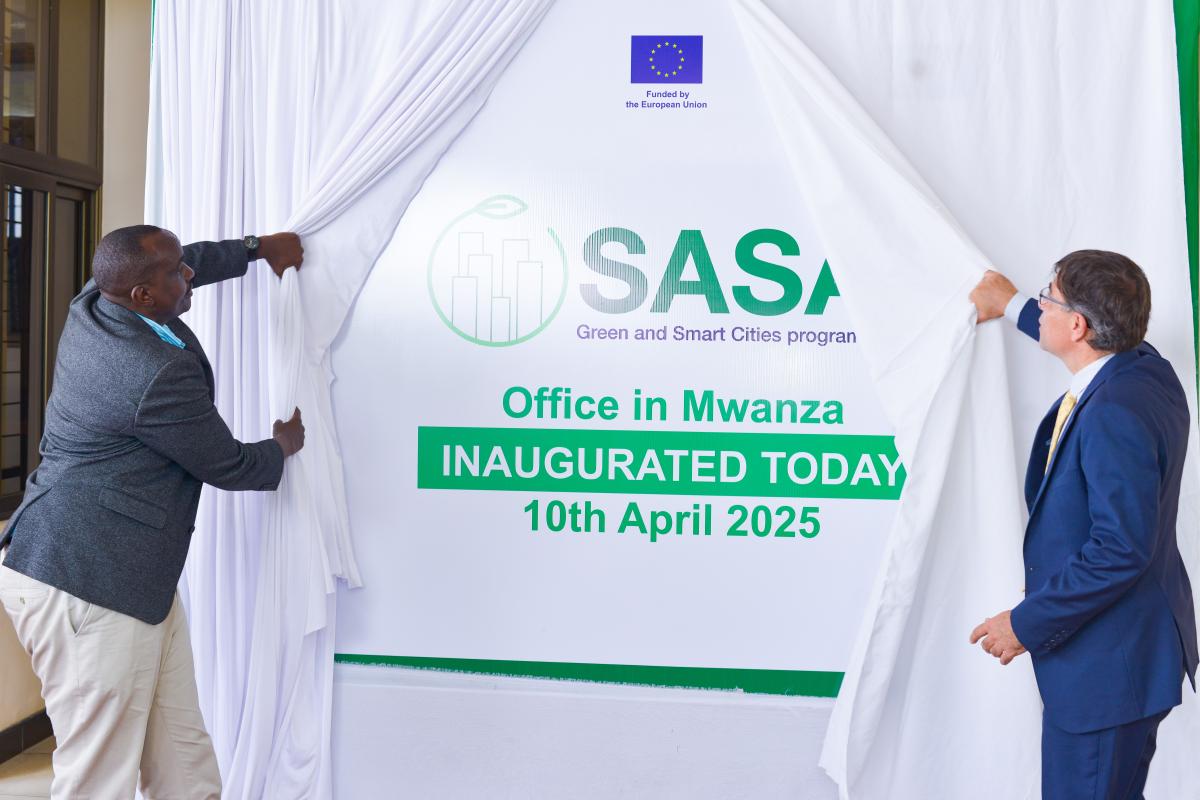
Tanzania: Team Europe launches joint office in Mwanza, hosted by Enabel
Mkama MWIJARUBI | 11/04/2025
A high-level delegation of Heads of Cooperation from the European Union and its Member States this week visited projects that TeamEurope supports in Mwanza City to strengthen the EU-Tanzania partnership and advance new investments in sustainable urban development. During the visit the delegation teamed with their host, the Mwanza regional administration, to visit a water treatment plant in Butimba and inaugurate the Team Europe Programme Office in Mwanza. The Butimba Water Treatment Plant, a flagship investment under the Lake Victoria Water and Sanitation Project, supplies piped clean water to nearly 500 people in Southern part of Mwanza. The TeamEurope’s visit also marked the official launch of the Team Europe Programme Office in Mwanza, a joint space established under the Green and Smart Cities SASA Programme to enhance coordination and collaboration between implementing partners on the ground. Graced by the Assistant Regional Administrative Officer, responsible for Industry, Investment, and Trade, Mr. Patrick Karangwa, the office launch ceremony gathered heads of cooperation from Belgium, Denmark, France, Germany, Ireland, Sweden, and the Netherlands. Mr. Karangwa said the regional administration will ensure continued collaboration for the impactful use of SASA resources and expertise to bring anticipated results. “I’m particularly optimistic that SASA results will be sustainable and replicable to other cities in Tanzania because the program builds on local expertise and resources,” he said. Enabel Tanzania hosts the SASA office in Mwanza and implements TeamEurope’s Inclusive Green and Smart Cities Project (INCLU-CITIES). Besides the water and sanitation project, SASA has supported the improvement of the Mwaloni fish market and the City’s abattoir. “Through the SASA programme, we’re supporting cities to become more inclusive, resilient, and better equipped to meet the needs of their growing populations,” said Marc Stalmans, EU Head of Cooperation. “This partnership is not only about infrastructure—it’s about dignity, access, and opportunity for the people of Tanzania.” Mwanza is one of the fastest-growing cities in Sub-Saharan, Africa. The World Bank estimates that its population will double by 2035. “Mwanza needs climate-resilient urban planning to provide important services to its citizens. Water supply needs to reduce losses, and sanitation needs to reach its customers,” said Tobias Godau, GIZ Programme Manager for Water and Climate Change. He represented GIZ Country Director at the event. The Enabel Country Director, Mr Koenraad Goekint said, “This initiative represents a significant milestone in our collective efforts to foster sustainable urban development. The Green and Smart Cities Project is not just about modernizing infrastructure; it is about creating resilient, inclusive, and environmentally friendly urban spaces that can thrive in the face of future challenges.” The Green and Smart Cities SASA Programme is designed to improve urban living in Mwanza, Tanga, and Pemba, supporting Tanzania’s efforts to address rapid urban growth. With total investment of over TZS 813 billion (EUR 325 million) focuses on expanded urban service delivery, increased local revenue mobilization and economic opportunities for women and youth in underserved communities. In Mwanza, SASA through Enabel focuses on building a sustainable local economy - enhancing food processing, supporting the fishing industry, and promoting a circular economy. These initiatives are designed to create jobs, boost local businesses, and ensure that economic growth is both inclusive and environmentally sustainable. Utilising a common office space facilitates collaboration among organizations that implement SASA Programme, which are GIZ from Germany, Enabel from Belgium, and AFD from France.
-
Enabel joins celebrations of 50 years of provision of vocational education in Tanzania
Mkama MWIJARUBI | 11/04/2025
Vocational education is gaining popularity in Tanzania, country where youth, aged 35 and below make 70 percent of the population. In that light, the Vocational Education and Training Authority (VETA) marked a significant milestone in 2025 by celebrating 50 years of vocational education and training (VET) in Tanzania and 30 years since the establishment of VETA as an autonomous agency. The celebrations culminated in a national event from March 18th to 21st, 2025, at the Julius Nyerere International Conference Centre (JNICC) in Dar es Salaam. The event was graced by high-ranking government officials, including Prime Minister Hon. Kassim Majaliwa Majaliwa for the opening ceremony and Deputy Prime minister Dr. Doto Biteko for the closing ceremony. Enabel Tanzania participated in the commemoration activities as one of the main sponsors with the main objective of positioning Enabel as a leading partner in Tanzania’s TVET and skills development sector. Enabel exhibition booth was strategically placed and branded with the key message “supporting Skilling Youth for Decent Jobs” highlighting our work with VETA in our Wezesha Binti and Inclucities programmes. The booth got was visited by various participants, including the Prime Minister, Kassim Majaliwa, who received an explanation of the agency’s mission and impact. The Enabel team was represented by the Country Director, Mr. Koen GOEKINT on the opening day, who delivered a speech to the attendees and was awarded a Certificate of Excellence in contribution to vocational education from the Prime Minister. During the four days at the booth and participation in the presentations, Enabel staff interacted with participants and informed them of its mission and impact on TVET and other projects. Most of these interactions happened at the booth where staff responded to inquiries from media, students, parents and the general public about Enabel programmes and its work on TVET. Enabel TVET experts actively participated in discussions centred on best practices and the future of TVET in Tanzania. On the closing day, the Wezesha Binti Project Manager Ms. Christine Karungi represented the development partners and delivered a speech before the Deputy Prime Minister. Ms Karungi is a chairperson of TVET Working Group that discusses and advises the government on TVET policy. The VETA Director General presented a Certificate of Appreciation to the sponsors—including Enabel— in recognition of their contributions to vocational education development. Different topics were discussed during the 4 days of commemoration including the impact of vocational education on socio-economic development, Future Prospects in Vocational Education, Vocational Education in Secondary Schools, and Industry Partnerships and Collaboration.
-
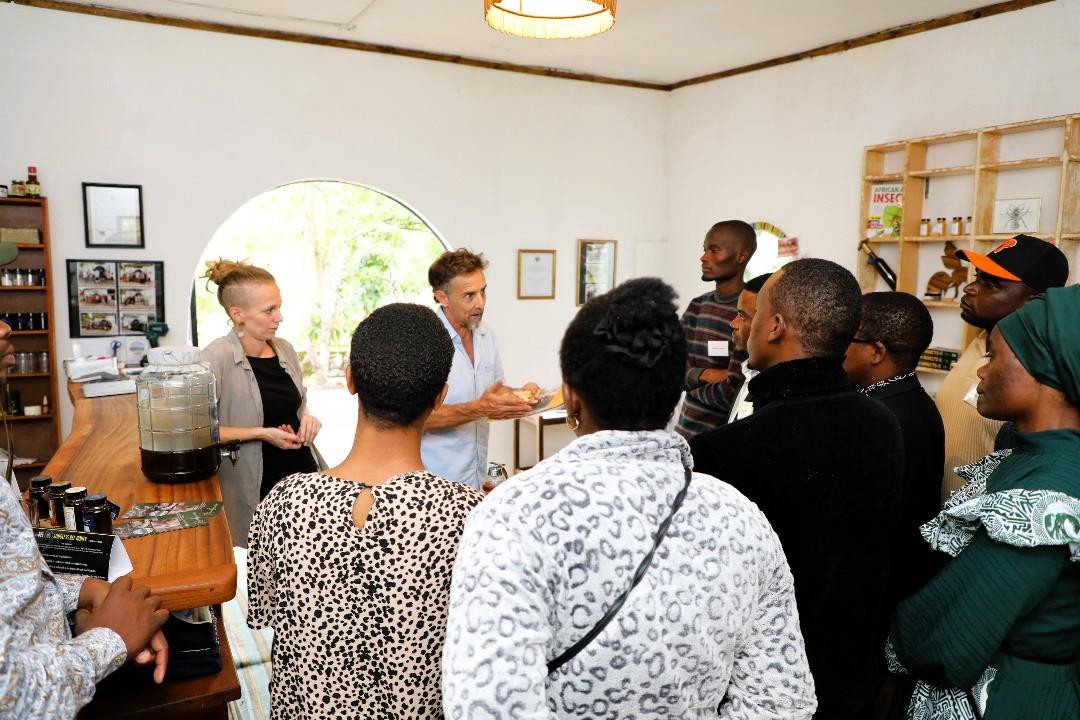
Enhance capacity to conduct Api-tourism in Tanzania
Deogratius KIMENA | 11/03/2025
With the growing awareness and increasing demand for api tourism in Tanzania, Enabel is strengthening the capacity of training institutions both mainland Tanzania (The Beekeeping Training Institute) and Zanzibar (The School of Agriculture under the State University of Zanzibar). This initiative aims to enhance local institutions' ability to support the need of the sector more effectively while leveraging new opportunities in beekeeping, ultimately contributing to the expansion of the country's tourism industry.
